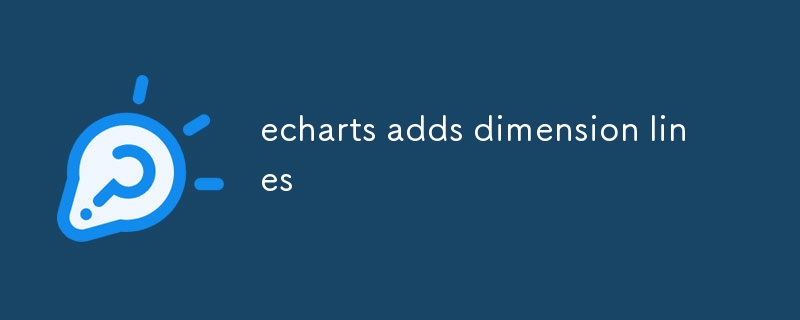
Hier ist ein Beispiel für die Verwendung der MethodeDieser Artikel behandelt die Methoden und Eigenschaften zum Hinzufügen von Anmerkungslinien zu Echarts-Diagrammen. Es erklärt, wie Sie ihre Start- und Endpunkte positionieren sowie ihr Erscheinungsbild und ihren Text anpassen. Der Schwerpunkt liegt auf der Verwendung von addAnnotationLine() m Verfahren. Diese Methode benötigt zwei Parameter: ein Objekt, das die Konfiguration der Linie angibt, und die Instanz des Diagramms.
addAnnotationLine():const myChart = echarts.init(document.getElementById('myChart'));
const line = {
type: 'line', // 'line', 'curve'
x: [10, 20], // Coordinates of the line's starting and ending points.
y: [10, 20],
symbol: ['none', 'none'], // Symbols at the starting and ending points.
label: { // Label attached to the line.
show: true,
formatter: 'annotation line'
}
};
myChart.addAnnotationLine(line); So positionieren Sie den Anfang von Anmerkungslinien und Endpunkte in Echarts?
So positionieren Sie den Anfang von Anmerkungslinien und Endpunkte in Echarts?x und y des Konfigurationsobjekts der Linie positioniert werden. Jede Eigenschaft akzeptiert ein Array aus zwei Zahlen, die die X- und Y-Koordinaten des Punkts darstellen.Beispielsweise positioniert die folgende Konfiguration die Linie so, dass sie bei (10, 10) beginnt und bei (20, 20) endet:addAnnotationLine() method. This method takes two parameters: an object specifying the line's configuration, and the chart's instance.
Here's an example of how to use the addAnnotationLine() method:
const line = {
x: [10, 20],
y: [10, 20]
};The starting and ending points of an annotation line can be positioned using the x and y
const line = {
lineStyle: {
color: 'red',
width: 2
},
symbol: ['circle', 'circle'],
label: {
show: true,
formatter: 'Custom Annotation Line'
}
};Das obige ist der detaillierte Inhalt vonEcharts fügt Maßlinien hinzu. Für weitere Informationen folgen Sie bitte anderen verwandten Artikeln auf der PHP chinesischen Website!
 Was tun, wenn der Bluescreen-Code 0x0000007e auftritt?
Was tun, wenn der Bluescreen-Code 0x0000007e auftritt?
 Welche Software ist Soul?
Welche Software ist Soul?
 Einführung in die Verwendung der Achsenfunktion in Matlab
Einführung in die Verwendung der Achsenfunktion in Matlab
 Der Unterschied zwischen WeChat-Dienstkonto und offiziellem Konto
Der Unterschied zwischen WeChat-Dienstkonto und offiziellem Konto
 So zentrieren Sie die Webseite in Dreamweaver
So zentrieren Sie die Webseite in Dreamweaver
 Samsung s5830-Upgrade
Samsung s5830-Upgrade
 Was sind die Marquee-Parameter?
Was sind die Marquee-Parameter?
 Die Rolle dieses Zeigers in C++
Die Rolle dieses Zeigers in C++
 Formelle Handelsplattform für digitale Währungen
Formelle Handelsplattform für digitale Währungen




